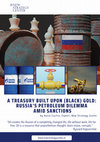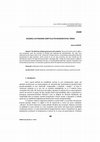International trade & competition by Horia Ciurtin

Neither universalism nor isolationism can be regarded as legitimate representations of a pluralis... more Neither universalism nor isolationism can be regarded as legitimate representations of a pluralist global society. Evidence can be brought that in economic terms the current paradigm engenders instability by enhancing inequality within and among diverse constituencies. The present-day factual reality denies the zero-sum game pattern and together with that the reliability of the Westphalian model. What type of legal processes should be used in order to ensure investor protection for the purpose of concluding free trade agreements between the EU and a sovereign of equal calibre? With this question in mind and against the factual reality of an enlarged EU and other altered economic contingencies, we engaged in the study of a number of relevant disputes on investor protection obligations and state aid control. The analysis includes a brief scrutiny of Commission proposals as regards most recently discussed FTAs and responses received from the Parliament and Council representing the multileveled EU constituency. A historical outlook into the formation and development of the Westphalian order and the parallel progressive transformation of the EU from a political confederation towards a form of federal state acting within a defined area of conferred powers is used as a platform for further reflection towards a post-Westphalian future. Eventually, the article advocates a model based on enhanced systematic, thus open communication across various constituencies and a more perceptive contemplation of the interactions between state and non-state trade governance as ground for a new conception of international trade relations in the new millennium.
Papers by Horia Ciurtin
Social Science Research Network, Dec 4, 2017

New Strategy Center, 2022
The analysis highlights the Russian Federation’s instrumentalisation of the energy “weapon” as a ... more The analysis highlights the Russian Federation’s instrumentalisation of the energy “weapon” as a means to change the negotiation framework with the West over the Ukraine conflict, focusing on Moscow’s oil exports.
In this respect, the study highlights the central position that the economic exploitation of this resource has in establishing a reliable budgetary year, and, as a result, in financing the war effort. At the same time, the analysis considers the effect of the sanctions imposed by the United States, the European Union and their allies on the economic ‘geography’ of oil exports, highlighting the alteration of traditional supply chains and the reconfiguration of the way in which the Russian Federation operates on global energy markets, in the context of a quantitative and qualitative metamorphosis of privileged destinations.
At the geo-economic level, the study addresses the medium- and long-term strategic sustainability of such a new export model – with a significant increase in volumes shipped to China, India, Turkey, and a few other circumstantial recipients – at a time when Moscow’s interdependence with its Asian partners is not a comfortable development in the face of considerable discounts and a price ceiling that is expected at the G7 level.
Social Science Research Network, 2016
Social Science Research Network, Jul 28, 2016
Social Science Research Network, May 3, 2016

The dilemmas of legal autonomy in late modenity. The present article seeks to offer a new perspec... more The dilemmas of legal autonomy in late modenity. The present article seeks to offer a new perspective upon the necessity of thinking and analyzing law philosophically. The main issue addressed by this inquiry refers to the "autonomy" of legal sciences, a long-lasting jurisprudential doctrine perpetuated by legal positivism, which proved to be not only erroneous, but also harmful for the development of law in the light of the postmodern "paradigm shift". Finally, this study proposes a different type of interaction between philosophy and law, an interdisciplinary field that surpasses iuspositivist and iusnaturalist perspectives, in an attempt to guide law within the labyrinth of contemporary social sciences. Keywords: philosophy of law; postmodernism; autonomy of law; legal positivism. Cuvinte-cheie: filosofia dreptului; postmodernism; autonomia dreptului; positivism juridic. 1. Introducere Într-o epocă definită de instabilitate cronică, în care fundamentele clasic...
Social Science Research Network, Jul 19, 2016

New Strategy Center, 2022
„Squaring the Circle: The (Improbable) Quest for Strategic Equilibrium in Turkish-Russian Relatio... more „Squaring the Circle: The (Improbable) Quest for Strategic Equilibrium in Turkish-Russian Relations” is a new study published by the New Strategy Center, representing a brief assessment of the relations between Russia and Turkey.
The analyze is written by Horia Ciurtin, associated expert at New Strategy Center, and benefits from an introduction by General (Ret.) Sir James Everard, former Deputy Supreme Allied Commander Europe (DSACEUR) and Honorary Chairman of the International Consultative Board of the New Strategy Center.
The study considers the asymmetrical relations of the two countries: the economic collaboration, the neutral but cordial approach on political issues, but also the attempts to avoid military confrontation on different disputes, such as Libya and Nagorno-Karabakh. The study is not only analyzing how the relationship between the two players has developed, but is also assessing their interdependencies and the consequences that a decay of these links may have. “In the context of such intense geopolitical movements, this study not only reminds us all of Turkey’s unique position within NATO, but is a welcome opportunity to reflect on the way history shapes the present” writes General (Ret.) Sir James Everard in the introduction of the study.

New Strategy Center , 2022
Russia’s invasion of Ukraine altered the structure and the fundamentals of post- Cold War securi... more Russia’s invasion of Ukraine altered the structure and the fundamentals of post- Cold War security architecture. In more than one sense, it appeared unequivocally that few things shall remain untarnished in matters pertaining to the order of state-to-state interactions or the (crumbling) self-desired universality of international law. But such a metamorphosis of perception did not limit to issues of high politics, military doctrine or legal responsibility in times of war.
Simultaneously with Russia’s terrestrial deployment of large-scale destruction upon its neighbor, a naval blockade was instituted, effectively sealing all of Ukraine’s (remaining) Black Sea ports from their commerce with the wider world. More than 20 tons of agricultural products – headed for export – remained grounded in the docks and inland silos, unable to reach global markets. Then followed a systematic campaign of incapacitating Ukraine’s grain-producing sector: dismantling of infrastructure, theft of stocked harvests, removal of equipment and industrial hardware.
The whole world witnessed Russia’s (ab)use of famine as a threat aimed not merely at Ukraine, but to the entire array of Kyiv’s customers overseas. And, in this sense, the present study will proceed by explaining the two actors’ centrality and relevance in the global food supply chains. Further on, it will address the manner in which the war changed both their positions and those of regular overseas customers, leading to a race to buy and stock on a disrupted market. In the final parts, the short- and medium-term solutions to the crisis will be analyzed, struggling to glimpse the new ‘horizon’ of food supply and the larger global market in the aftermath of the blockade.
With or without the blockade, a significant part of the transnational agricultural export capacity had been affected by Russia’s invasion, proving that wars (and their subsequent effects) cannot be ‘grounded’ and ‘isolated’. What happens in Ukraine, might not stay in Ukraine, but provoke hunger across the other side of the globe.
The Concept of Price in the new Romanian Civil Code: a Comparative-Critical Approach. The present... more The Concept of Price in the new Romanian Civil Code: a Comparative-Critical Approach. The present study focuses on the concept of price in Romania's New Civil Code, bearing in mind the diverging jurisprudential traditions of European law. In this sense, as it shall be established further, the present Romanian rules concerning the price offer an interesting perspective regarding the possibility of synchronising various theories of contract law-i.e. aristotelic-finalistic and voluntaristic. However, the sometimes faulty manner in which the proposed "reform" of Civil Law was carried out in Romania, also provides the image of a not so rigorous and systematic approach toward the concept of price, leaving this particular element of the contract in an uncertain position which needs further praetorian determinations.

PSN: Culture (Topic), 2017
As neither Russia, nor Turkey seem to have reached the ‘end of history’, their proximity and pers... more As neither Russia, nor Turkey seem to have reached the ‘end of history’, their proximity and persistent narratives of cultural-religious clash, still provide reasons for mounting frictions. Not necessarily in a military sense – although minor incidents have occurred – but in a race to the bottom for winning the hearts and minds (or pockets) of polities from their overlapping spheres of influence. In a certain sense, this competition resembles a cat-and-mouse game across three seas, two mountain ranges and one desert. The enlarged neighbourhood is tackled economically by the two actors in a strategy of mutual containment and counter-containment, trying to ensure regional allegiances which would enforce each other’s position in their bilateral dynamics. Both Russia and Turkey deploy trade and investment in a strategic manner, in line with classical geoeconomic thinking , seeking to alter the fragile equilibrium in the area and – finally – to reach another asymmetric balance. While pol...

At the fringes of the European Union, but entirely engulfed by it, the Balkan countries have set ... more At the fringes of the European Union, but entirely engulfed by it, the Balkan countries have set upon their quest for integration ever since the late ‘90s. During their lasting interaction, the partners have engaged in an often-inconsistent negotiation framework that moved from the idea of “sharing everything but institutions” to a more cautious approach, dominated by (im)patience and mutual demands that did not generate any tangible outcome. For these reasons, the present inquiry re-traces the conceptual assumptions of EU enlargement towards the Balkans (and its geopolitical imperatives), showing the reasons why this tale appears as one of “unconsummated romance”. Analysing how the re-emergence of power politics modified the EU itself (and its self-understanding), our paper emphasizes the metamorphosis of such a relationship, while offering some distinct hermeneutics. In the end, a way out of this inertia is presented, pleading for a more flexible calibration of the EU policy towar...
The present study mainly concentrates upon a public law perspective of consent, on its relation w... more The present study mainly concentrates upon a public law perspective of consent, on its relation with the notion of sovereignty, emphasising the shortcomings of State-centric theories and the impasse reached by confining consent in a positivist manner. In addition, the asymmetries of consent are brought to the forum, in a quest for revealing how sovereignty affects the fictional equal standing of the actors in the arbitration process and – most important – why the notion of consent itself does not serve any longer as a legitimating factor for our legal-political constructs.

Article Type: Research Paper Purpose—The present study aims to reconceptualize the underlying ten... more Article Type: Research Paper Purpose—The present study aims to reconceptualize the underlying tenets of Westphalian links between sovereignty and territoriality, showing how an “exported” eurocentric doctrine actually functions in a distinct legal environment—post-imperial China—and the manner in which a protracted politicalontological dispute can or cannot make use of established Westernbased legal mechanisms. Approach—By focusing on the crossstrait dilemma of overlapping claims to sovereignty upon a “greater” China—advanced both by the People’s Republic of China and the Republic of China (Taiwan)—we aim to show how volatile (and fragile) the functionality of Westphalia actually is. In this regard, we first concentrate upon the “genealogy” of Westphalia itself, as well as on the competing narrative of Sinocentric regional order, setting the scene for an unavoidable clash of paradigms. Afterwards, it is shown how the allegedly victorious vision of Westphalia was rewritten (and conce...

European Economics: Macroeconomics & Monetary Economics eJournal, 2017
Romanian Abstract: In studiul de față ne-am propus să oferim o viziune istoric-conceptuală asupra... more Romanian Abstract: In studiul de față ne-am propus să oferim o viziune istoric-conceptuală asupra genezei instituționale a politicii europene in domeniul dreptului internațional al investițiilor. Incepând cu momentul unei competențe exclusive a statelor-membre, in manieră Westphaliană, și ajungând la competența exclusivă a Uniunii in această sferă (după momentul Lisabona), sunt evidențiate metamorfozele structurale ale strategiei comunitare. Din acest punct de vedere, prezentarea tratează tentativele – timide – de a găsi un mod eficient de rezolvare a situațiilor privind Tratatele de Investiții extra-UE (Regulamentul 1219/2012), precum și aporiile generate de acordurile intra-UE. Totodată, in ultima parte, se reliefează noile abordări comunitare, pe fondul negocierilor unor tratate bilaterale cu Singapore (EUSFTA), Canada (CETA) și SUA (TTIP), in incercarea de a găsi un parcurs coerent. English Abstract: The present study offers a historical and conceptual inquiry upon the instituti...

China's International Investment Strategy, 2019
The author provides a post-sovereign enquiry in Taiwan’s investment treaty system. Going beyond t... more The author provides a post-sovereign enquiry in Taiwan’s investment treaty system. Going beyond the traditional legal divisions, Taiwan showed that it can bypass such limitations, being a main trend-setter in innovating the area of international economic law. Specifically, a close look at Taiwan’s nexus of investment treaty is eye-opening; Taiwan concluded twenty-nine BITs and six ample economic cooperation agreements with related investment provisions. The number and the importance of these agreements reveal that the concept of international recognition does not directly influence the behaviour of states which are willing to interact legally and economically. In this regard, non-diplomatic relations might be used as a step forward, as Taiwan is closer to conclude an agreement with another post-sovereign entity, the European Union. This global actor may open up the scene for a multi-tier dynamic where some of its component member states are in principle against any liaison with Taiw...

Romanian Abstract: Articolul de față incearcă să ofere o nouă perspectivă asupra necesității de a... more Romanian Abstract: Articolul de față incearcă să ofere o nouă perspectivă asupra necesității de a gândi și analiza dreptul din punct de vedere filosofic. Chestiunea principală tratată in acest studiu se referă la „autonomia” științelor juridice - un concept indelung utilizat și promovat de școala pozitivistă - ce se dovedește a fi nu doar eronată, ci și dăunătoare pentru dezvoltarea dreptului in lumina unei schimbări postmoderne de paradigmă. In cele din urmă, acest studiu propune un mod diferit de interacțiune intre drept și filosofie,un câmp interdisciplinar ce depășește perspectivele iuspozitiviste și iusnaturaliste, in incercarea de a scoate dreptul din labirintul științelor sociale contemporane.English Abstract: The present article seeks to offer a new perspective upon the necessity of thinking and analyzing law philosophically. The main issue addressed by this inquiry refers to the “autonomy” of legal sciences, a long-lasting jurisprudential doctrine perpetuated by legal posit...

Transnational Dispute Management, 2015
The present study begins by reconsidering the conceptual genesis of the ‘damage mitigation’ princ... more The present study begins by reconsidering the conceptual genesis of the ‘damage mitigation’ principle in relation to its expansion beyond its initial common law boundaries. Thus, its transition to ‘lex mercatoria’ is depicted, emphasising the gradual manner in which the ‘mitigation of damages’ transformed into a fundamental principle of customary international law. Following this path, we further analyse the normative content of this principle in a number of interconnected and overlapping areas of international law.More precisely, our initial ‘cosmological’ approach is supplemented with a detailed inquiry into the concept’s applications in commercial legal instruments – such as the CISG, the UNIDROIT Principles and the PECL, and arbitral awards, along with an analysis of its functional avatars in customary international and investment law. In this regard, our study proposes – alongside the already mentioned objectives – to exhaustively treat the forms in which ‘harm mitigation’ occu...











Uploads
International trade & competition by Horia Ciurtin
Papers by Horia Ciurtin
In this respect, the study highlights the central position that the economic exploitation of this resource has in establishing a reliable budgetary year, and, as a result, in financing the war effort. At the same time, the analysis considers the effect of the sanctions imposed by the United States, the European Union and their allies on the economic ‘geography’ of oil exports, highlighting the alteration of traditional supply chains and the reconfiguration of the way in which the Russian Federation operates on global energy markets, in the context of a quantitative and qualitative metamorphosis of privileged destinations.
At the geo-economic level, the study addresses the medium- and long-term strategic sustainability of such a new export model – with a significant increase in volumes shipped to China, India, Turkey, and a few other circumstantial recipients – at a time when Moscow’s interdependence with its Asian partners is not a comfortable development in the face of considerable discounts and a price ceiling that is expected at the G7 level.
The analyze is written by Horia Ciurtin, associated expert at New Strategy Center, and benefits from an introduction by General (Ret.) Sir James Everard, former Deputy Supreme Allied Commander Europe (DSACEUR) and Honorary Chairman of the International Consultative Board of the New Strategy Center.
The study considers the asymmetrical relations of the two countries: the economic collaboration, the neutral but cordial approach on political issues, but also the attempts to avoid military confrontation on different disputes, such as Libya and Nagorno-Karabakh. The study is not only analyzing how the relationship between the two players has developed, but is also assessing their interdependencies and the consequences that a decay of these links may have. “In the context of such intense geopolitical movements, this study not only reminds us all of Turkey’s unique position within NATO, but is a welcome opportunity to reflect on the way history shapes the present” writes General (Ret.) Sir James Everard in the introduction of the study.
Simultaneously with Russia’s terrestrial deployment of large-scale destruction upon its neighbor, a naval blockade was instituted, effectively sealing all of Ukraine’s (remaining) Black Sea ports from their commerce with the wider world. More than 20 tons of agricultural products – headed for export – remained grounded in the docks and inland silos, unable to reach global markets. Then followed a systematic campaign of incapacitating Ukraine’s grain-producing sector: dismantling of infrastructure, theft of stocked harvests, removal of equipment and industrial hardware.
The whole world witnessed Russia’s (ab)use of famine as a threat aimed not merely at Ukraine, but to the entire array of Kyiv’s customers overseas. And, in this sense, the present study will proceed by explaining the two actors’ centrality and relevance in the global food supply chains. Further on, it will address the manner in which the war changed both their positions and those of regular overseas customers, leading to a race to buy and stock on a disrupted market. In the final parts, the short- and medium-term solutions to the crisis will be analyzed, struggling to glimpse the new ‘horizon’ of food supply and the larger global market in the aftermath of the blockade.
With or without the blockade, a significant part of the transnational agricultural export capacity had been affected by Russia’s invasion, proving that wars (and their subsequent effects) cannot be ‘grounded’ and ‘isolated’. What happens in Ukraine, might not stay in Ukraine, but provoke hunger across the other side of the globe.
In this respect, the study highlights the central position that the economic exploitation of this resource has in establishing a reliable budgetary year, and, as a result, in financing the war effort. At the same time, the analysis considers the effect of the sanctions imposed by the United States, the European Union and their allies on the economic ‘geography’ of oil exports, highlighting the alteration of traditional supply chains and the reconfiguration of the way in which the Russian Federation operates on global energy markets, in the context of a quantitative and qualitative metamorphosis of privileged destinations.
At the geo-economic level, the study addresses the medium- and long-term strategic sustainability of such a new export model – with a significant increase in volumes shipped to China, India, Turkey, and a few other circumstantial recipients – at a time when Moscow’s interdependence with its Asian partners is not a comfortable development in the face of considerable discounts and a price ceiling that is expected at the G7 level.
The analyze is written by Horia Ciurtin, associated expert at New Strategy Center, and benefits from an introduction by General (Ret.) Sir James Everard, former Deputy Supreme Allied Commander Europe (DSACEUR) and Honorary Chairman of the International Consultative Board of the New Strategy Center.
The study considers the asymmetrical relations of the two countries: the economic collaboration, the neutral but cordial approach on political issues, but also the attempts to avoid military confrontation on different disputes, such as Libya and Nagorno-Karabakh. The study is not only analyzing how the relationship between the two players has developed, but is also assessing their interdependencies and the consequences that a decay of these links may have. “In the context of such intense geopolitical movements, this study not only reminds us all of Turkey’s unique position within NATO, but is a welcome opportunity to reflect on the way history shapes the present” writes General (Ret.) Sir James Everard in the introduction of the study.
Simultaneously with Russia’s terrestrial deployment of large-scale destruction upon its neighbor, a naval blockade was instituted, effectively sealing all of Ukraine’s (remaining) Black Sea ports from their commerce with the wider world. More than 20 tons of agricultural products – headed for export – remained grounded in the docks and inland silos, unable to reach global markets. Then followed a systematic campaign of incapacitating Ukraine’s grain-producing sector: dismantling of infrastructure, theft of stocked harvests, removal of equipment and industrial hardware.
The whole world witnessed Russia’s (ab)use of famine as a threat aimed not merely at Ukraine, but to the entire array of Kyiv’s customers overseas. And, in this sense, the present study will proceed by explaining the two actors’ centrality and relevance in the global food supply chains. Further on, it will address the manner in which the war changed both their positions and those of regular overseas customers, leading to a race to buy and stock on a disrupted market. In the final parts, the short- and medium-term solutions to the crisis will be analyzed, struggling to glimpse the new ‘horizon’ of food supply and the larger global market in the aftermath of the blockade.
With or without the blockade, a significant part of the transnational agricultural export capacity had been affected by Russia’s invasion, proving that wars (and their subsequent effects) cannot be ‘grounded’ and ‘isolated’. What happens in Ukraine, might not stay in Ukraine, but provoke hunger across the other side of the globe.